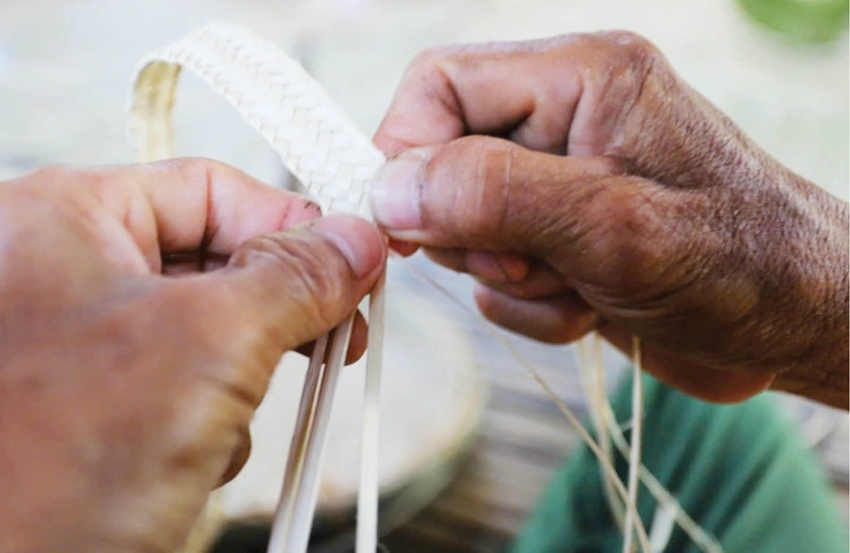In Doi village (Thuong Lo Commune, Nam Dong District, Thua Thien Hue Province), there is a special man who quietly and diligently preserves and promotes the traditional values of the Cơ Tu ethnic group. This man is Pơloong Chướch, a senior artisan who has dedicated his entire life to the craft of weaving.

Mr. Pơloong Chướch continuously creates unique products every day. Photo: Vơ Ních Oang
Preserving and passing down the craft
The craft of weaving, one of the traditional crafts of the Cơ Tu people, serves not only as a practical skill in daily life but also reflects the unique cultural identity of the community.
At 75 years old, despite his declining health, Pơloong Chướch remains passionate about weaving with bamboo and rattan. Under his nimble and skillful hands, bamboo and rattan strands gradually take shape, forming products like backpacks, baskets, and bags, … all are with unique designs and patterns. What makes his products even more special is that they not only cater for daily life needs but also attract tourists to Doi village.
In recent years, Doi village has emerged as an appealing community-based tourism destination. Visitors come to admire the breathtaking natural scenery and experience the tranquil life while exploring the traditional culture of the Cơ Tu people. The bamboo and rattan backpacks and traditional ethnic baskets made by Pơloong Chướch have become popular souvenirs among tourists, helping to increase his family’s income as well as that of the local community.
For over 10 years dedicated to the craft of weaving for community-based tourism, Pơloong Chướch has continuously fostered innovation to create visually appealing, durable products that meet the needs of tourists. He emphasizes that the key to producing high-quality items lies in the selection and processing of raw materials. This is because bamboo, rattan, and cane must be sourced from deep forests and undergo meticulous treatment to ensure durability and maintain their natural colors.
Beyond doing his own crafts, Pơloong Chướch is committed to teaching and encouraging young people in the village to learn the crafts. He shared, “In the past, almost everyone knew how to weave, but over time, many have quitted this job. Therefore, I do hope that the younger generation will continue to preserve and develop this traditional craft.”
Thanks to his relentless efforts and the community’s involvement, the traditional craft of weaving has experienced a strong revival. More tourists are visiting Doi village not only to admire the intricate handmade products but also to gain a deeper understanding of the Cơ Tu people’s cultural heritage. The craft products of Pơloong Chướch has become a symbol of local culture, serving as a bridge between the past and present, connecting ethnic cultures with visitors from afar.
Preserving cultural values
Pơloong Chướch is not only renowned for his basket weaving expertise but also for his dedication to preserving the cultural heritage of the Cơ Tu people. He actively participates in village cultural events, from drumming and gong performances to showcasing traditional customs and introducing visitors to the Cơ Tu way of life.
During cultural exchanges, he often shares stories about his people’s traditions and customs. Whenever visitors come by, he eagerly demonstrates his weaving techniques on the spot, explaining everything from the selection of materials to the processing of bamboo and rattan to create durable and beautiful products. This not only fascinates visitors but also helps them appreciate the cultural significance of the craft.
A Lăng Thị Bé, Director of the Ka Zan Waterfall Community Tourism Cooperative, where Pơloong Chướch is working, informed, “This great man is highly experienced and passionate about preserving our cultural heritage. He is not only a guardian of the traditional craft but also an inspiration to the younger generation in preserving and promoting Cơ Tu culture.”
Mr. Lê Thanh Hồ, Vice Chairman of the Nam Đông District People’s Committee, shared that the district was organizing workshops to pass on experience on gongs performance, weaving, and traditional zèng fabric weaving to the locals. These workshops aim not only to preserve traditional crafts, promote good values left by the ancestors but also to foster the creation of high-quality tourism products that attract visitors.
Non-governmental organizations, such as Helvetas, have also supported the development of community-based tourism in Doi village from 2022 to 2025. These projects have improved local tourism infrastructure and given local dwellers an opportunity to engage in sustainable tourism development. In particular, Nam Dong district has built 7 new homestays to serve tourists from the investment and support sources with a total cost of more than 3 billion VND; at the same time, purchased traditional musical instruments such as gongs, panpipes, etc., to serve community activities and tourism. These efforts have significantly boosted community-based tourism and improved the livelihoods of local residents.
The craft of weaving is not only a craft but also a bridge for Mr. Pơloong Chướch to introduce Cơ Tu culture to the world. His dedication and passion continue to inspire generations not only in Doi village but throughout the Cơ Tu community as well. The values that he and the villagers are striving to preserve will continue to thrive and grow, along with the development of community-based tourism.
Story: Diep Chi
Source: Hue News – news.baothuathienhue.vn – Oct 20, 2024




